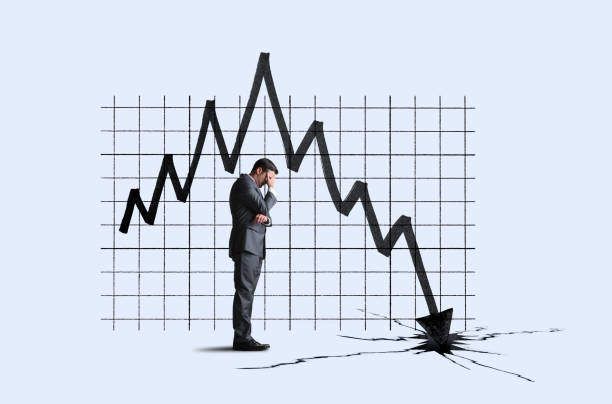In the world of finance, few events evoke as much fear and uncertainty as a stock market crash. These harrowing episodes of market turbulence can send shockwaves through the global economy, affecting investors, businesses, and everyday citizens alike. In this comprehensive guide, we will delve deep into the topic of a stock market crash, exploring its causes, effects, and crucial precautions investors can take to navigate these turbulent waters.
Understanding the Basics
What Is a Stock Market Crash?
A stock market crash refers to a sudden and severe decline in the value of stocks traded on the stock exchange. It is characterized by a rapid and substantial drop in stock prices, often leading to widespread panic selling. While stock market crashes are relatively rare, their impact can be profound and far-reaching.
Historical Precedents
To gain insights into the nature of stock market crashes, it’s essential to examine historical examples. Notable crashes, such as the Great Depression of 1929, the Dot-Com Bubble Burst of 2000, and the Financial Crisis of 2008, provide valuable lessons on the causes and consequences of these events.
Causes of a Stock Market Crash
1. Speculative Bubbles
One of the primary triggers of a stock market crash is the formation of speculative bubbles. These occur when investors drive up the prices of certain stocks or assets to unsustainable levels based on irrational exuberance rather than fundamental value.
2. Economic Downturns
Economic downturns, such as recessions or financial crises, can spark fear and uncertainty in the stock market. When investors anticipate economic troubles, they may rush to sell their holdings, contributing to a market crash.
3. Black Swan Events
Black Swan events are unforeseen, highly impactful events that can trigger market crashes. These events, like natural disasters or geopolitical conflicts, are challenging to predict but can have a profound effect on market sentiment.
Effects of a Stock Market Crash
1. Wealth Erosion
A stock market crash can result in significant wealth erosion for investors. Those who fail to exit the market in time may witness the value of their portfolios plummet.
2. Economic Contraction
Stock market crashes can lead to broader economic contractions. Reduced consumer spending, business investment, and lending are common consequences, potentially leading to job losses and reduced economic growth.
3. Investor Confidence
Market crashes can erode investor confidence for years to come. Many investors become wary of participating in the stock market, impacting long-term investment strategies.
Precautions for Investors
1. Diversification
Diversifying your investment portfolio across various asset classes can help mitigate the impact of a stock market crash. By spreading risk, investors can reduce their exposure to individual stock price fluctuations.
2. Risk Management
Implementing robust risk management strategies, such as setting stop-loss orders and maintaining an emergency fund, can safeguard your investments during turbulent times.
3. Long-Term Perspective
Maintaining a long-term investment perspective and avoiding knee-jerk reactions to market fluctuations can help investors weather the storm. Historically, markets have rebounded after crashes.
The Role of Government and Central Banks
During a stock market crash, governments and central banks often intervene to stabilize the financial system. They may lower interest rates, inject liquidity into the market, and implement fiscal stimulus measures to bolster economic recovery. These interventions aim to restore confidence and prevent a deeper and more prolonged recession.
Lessons from Past Crashes
Analyzing historical stock market crashes reveals several important lessons for investors. Firstly, market crashes are a part of the financial landscape, and prudent risk management is essential. Secondly, maintaining a diversified portfolio can help cushion the blow of a crash. Investors should consider not only different asset classes but also geographical diversification. This can further reduce risk by spreading investments across various regions, each with its economic conditions.
Strategies for Navigating a Stock Market Crash
1. Stay Informed
Keep a close eye on economic indicators, news, and market trends. Staying informed can help you make rational decisions during turbulent times. Additionally, consider using investment research tools and platforms to stay updated.
2. Avoid Emotional Trading
Emotions like fear and greed can lead to impulsive trading decisions. Stick to your investment strategy and avoid making emotional choices. This strategy may involve revisiting your investment plan and risk tolerance periodically.
3. Consider Safe-Haven Assets
During a market crash, consider allocating some of your investments to safe-haven assets like gold, government bonds, or defensive stocks. These assets tend to hold their value better during economic downturns and can provide stability to your portfolio.
4. Seek Professional Advice
Consult with a financial advisor who can provide guidance tailored to your financial goals and risk tolerance. They can help you develop a customized strategy that aligns with your long-term objectives and ensures you remain on track even during turbulent market conditions.
Conclusion
In conclusion, a stock market crash is a complex and daunting event that can have far-reaching consequences. By understanding the causes, effects, and taking prudent precautions, investors can navigate these challenging times with greater resilience.
FAQs
What is the difference between a market correction and a market crash?
A market correction is a short-term decline of 10% or more in stock prices, whereas a market crash involves a rapid and substantial drop of 20% or more.
Can stock market crashes be predicted?
Stock market crashes are notoriously difficult to predict accurately. They often result from a combination of factors and unforeseen events.
How should I react during a stock market crash?
It’s crucial to stay calm and avoid panic selling. Review your portfolio, consider rebalancing, and consult with a financial advisor if necessary.
Are there safe-haven assets during a market crash?
Assets like gold, U.S. Treasury bonds, and stable cryptocurrencies are considered safe havens during market turmoil.
Is it a good time to invest after a stock market crash?
Historically, markets have rebounded after crashes. Long-term investors may find opportunities to buy assets at lower prices.

